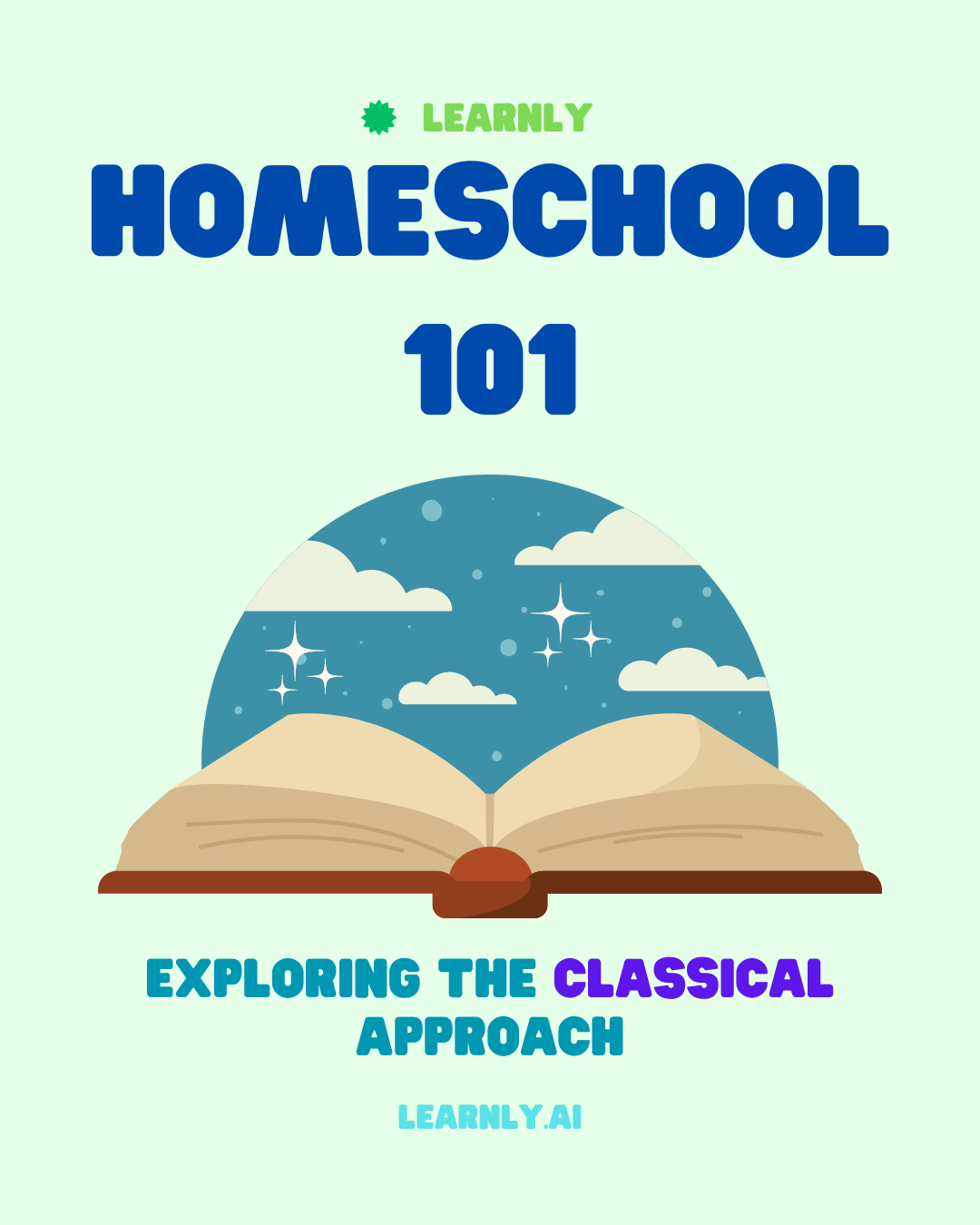Introduction to the Classical Approach to Homeschooling
As the world continues to change rapidly, more and more parents are exploring alternative forms of education for their children.
One such alternative that has been gaining popularity in recent years is homeschooling.
Homeschooling allows parents to tailor their child's education to their individual needs and interests, providing a flexible and personalized approach to learning.
One of the most popular homeschooling approaches is the Classical Approach, a time-tested method of education that has been used for centuries. 📚
This method emphasizes the importance of language and logic, as well as the Trivium, a three-part curriculum that focuses on grammar, logic, and rhetoric.
But what exactly is the Classical Approach, and who should use it?
Why has it become such a popular choice among homeschooling parents?
And most importantly, how can you implement the Classical Approach in your own homeschooling journey?
In this article, we'll explore the Classical Approach to Homeschooling in detail, providing you with the knowledge and resources you need to make an informed decision about whether this approach is right for you and your child.
Whether you're a seasoned homeschooling veteran or just starting out, join us as we dive into the world of the Classical Approach and discover its many benefits.
What is the Classical Approach to Homeschooling?
The Classical Approach to Homeschooling is a traditional method of education that has been used for centuries.
This philosophy and style are based on the idea that education should be centered around the Trivium. Meaning this three-part curriculum emphasizes grammar, logic, and rhetoric.
The Trivium was first proposed in ancient Greece and has been used as a basis for education ever since.
In the Classical Approach, students begin with the study of grammar, including language, history, and culture.
This is followed by the study of logic, which involves the development of critical thinking skills and the ability to analyze and interpret information.
Finally, students focus on rhetoric, which involves the development of communication skills and the ability to express themselves effectively.
One of the fundamental principles of the Classical Approach is that students should learn through reading and discussion.
Rather than simply memorizing information, students are encouraged to engage with the material, ask questions, and explore different perspectives.
This strategy fosters a love of learning and helps students develop the skills they need to become lifelong learners.
The Classical Approach is also known for its emphasis on studying classical literature and languages.
This includes the study of ancient Greek and Latin and the works of ancient philosophers and thinkers such as Plato, Aristotle, and Cicero.
Students and children gain a deeper understanding of history, culture, and the human experience by studying these works.
Overall, the Classical Approach to Homeschooling provides a comprehensive and rigorous education emphasizing critical thinking, communication skills, and a deep understanding of history and culture.
This approach has been used successfully for centuries and continues to be a popular choice among homeschooling parents today.
Who Should Use the Classical Approach to Homeschooling?
The Classical Approach to Homeschooling is an excellent option for parents who value a structured and rigorous approach to education.
This approach is best suited for curious, disciplined children who enjoy reading and discussion.
Students who thrive in the Classical Approach tend to be strong in language and have an aptitude for critical thinking and analysis.
While the Classical Approach can be challenging, it is also highly rewarding for kids willing to put in the effort.
In addition, students who use this approach often excel in college and beyond, as they have developed strong communication skills, critical thinking abilities, and a deep understanding of history and culture.
It's important to note that the Classical Approach may not be the best fit for every student.
Some children may struggle with the rigorous curriculum and the focus on classical literature and languages.
A more flexible or interest-based approach to homeschooling may be a better fit for these students.
That being said, the Classical Approach can be adapted to fit the student's individual needs.
Homeschooling parents can adjust the curriculum and teaching methods to match the student's strengths and weaknesses.
For example, suppose your child struggles with language but excels in math.
In that case, the curriculum can be adjusted to include more math-based subjects while still emphasizing critical thinking and analysis.
Ultimately, the decision to use the Classical Approach to Homeschooling should be based on the needs and interests of the student.
Therefore, parents should consider their child's learning style, interests, and academic goals before choosing a homeschooling approach.
However, the Classical Approach can provide an enriching and rewarding education for students of all backgrounds and abilities with the right approach and mindset.
Why Choose the Classical Approach to Homeschooling?
There are many reasons why homeschooling parents may choose the Classical Approach for their children's education.
One of the primary reasons is the focus on language and critical thinking skills.
In today's fast-paced world, it's more important than ever for students to analyze and interpret information and communicate effectively.
The Classical Approach provides a strong foundation in these skills, preparing students for success in college and beyond.
Another reason why parents may choose the Classical Approach is the emphasis on classical literature and languages.
Students gain a deeper understanding of history and culture by studying the works of ancient philosophers and thinkers.
This helps them develop a broader perspective on the world and their place in it.
The Classical Approach is also highly customizable, making it an ideal option for children with diverse interests and goals.
Homeschooling parents can adjust the curriculum and teaching methods to match their child's strengths and weaknesses, allowing them to tailor the education to their child's demands.
The Classical Approach is also known for its emphasis on character education.
By studying the works of ancient philosophers and thinkers, students gain a deeper understanding of virtues such as wisdom, courage, and justice.
These values are essential for success in all areas of life, including personal relationships, career, and community involvement.
Overall, the Classical Approach to Homeschooling provides a well-rounded education that prepares students for success in all areas of life.
With its focus on language, critical thinking, classical literature and languages, and character education, this approach provides a solid foundation for students to pursue their academic and personal goals confidently and successfully.
How to Use the Classical Approach to Homeschooling
The Classical Approach to Homeschooling is a highly structured and rigorous approach to education, but it can be adapted to fit the individual needs and interests of the student.
Here are some tips for using the Classical Approach to Homeschooling effectively: First, it's crucial to have a solid understanding of the principles and methods of the Classical Approach. This approach emphasizes the study of classical literature and languages, as well as critical thinking and analysis. Homeschooling parents should familiarize themselves with the curriculum and teaching methods before getting started. Next, parents should establish a consistent schedule and routine for their homeschooling days. The Classical Approach requires significant reading, writing, and discussion, so it's important to set aside dedicated time for these activities. A daily schedule should include time for reading, writing, math, and other subjects, as well as breaks and physical activity. Choosing high-quality curriculum materials and resources is essential to effectively use the Classical Approach. Many resources are available online and in bookstores designed explicitly for the Classical Approach. Homeschooling parents should carefully review the materials and choose those that best match their child's learning style and interests.
One of the critical elements of the Classical Approach is the use of the Socratic method, which involves asking questions and encouraging discussion and debate.
Homeschooling parents should be prepared to engage their children in lively discussions and encourage them to think critically and analytically.
This approach requires patience, creativity, and a willingness to let the child take the lead in their own learning.
Finally, homeschooling parents should be prepared to adapt and adjust the curriculum as needed to match their child's needs and interests.
The Classical Approach is highly customizable.
Parents can adjust the curriculum to include more math, science, or other subjects.
Parents can ensure that their child is engaged and motivated to learn by tailoring the education to the child's needs and interests.
Conclusion
In conclusion, the Classical Approach to Homeschooling is a highly effective method for providing children a well-rounded and rigorous education.
With an emphasis on critical thinking, classical literature and languages, and character education, this approach prepares students for success in all areas of life.
The Classical Approach is highly customizable, allowing parents to adjust the curriculum and teaching methods to match their child's needs and interests.
However, this style also requires a high degree of dedication and patience.
Parents must be willing to engage in lively discussions and encourage their children to think critically and analytically.
Overall, the Classical Approach to Homeschooling is an excellent option for parents looking for a structured and challenging educational program for their children.
With its focus on language, critical thinking, classical literature and languages, and character education, this approach provides a solid foundation for students to pursue their academic and personal goals confidently and successfully.
Homeschooling parents considering the Classical Approach should carefully review the principles and methods of this approach and be prepared to invest the time and effort required to provide their child with a high-quality education.
Resources & Tools
The Well-Trained Mind - A Guide to Classical Education at Home by Susan Wise Bauer - This book is a comprehensive guide to the Classical Approach to Homeschooling and includes detailed instructions on how to implement this approach in your homeschool.
Memoria Press - Memoria Press offers a complete Classical Christian Curriculum for homeschooling families. They provide lesson plans, textbooks, and online classes for children from kindergarten to high school.
Classical Conversations - Classical Conversations is a nationwide network of homeschooling families that follow the Classical Approach. They offer community-based learning and support, including curriculum resources and weekly meetings.
Institute for Excellence in Writing - The Institute for Excellence in Writing provides writing and language arts curriculum resources that align with the Classical Approach. Their materials are designed to help students develop critical thinking skills and become effective writers.
Ambleside Online - Ambleside Online provides a free online curriculum that follows the Charlotte Mason philosophy, which aligns closely with the Classical Approach. Their curriculum includes a wide range of subjects and resources for children of all ages.
Khan Academy - Khan Academy is a free online resource that provides educational videos and exercises in a variety of subjects, including math, science, and humanities. Their materials can be used to supplement any homeschooling curriculum, including the Classical Approach.
The Great Books Academy - The Great Books Academy provides a complete Classical curriculum that emphasizes the study of classical literature and history. Their program is designed for students from middle school through high school and includes online classes and support.
Classical Academic Press - Classical Academic Press provides a variety of resources for homeschooling families who follow the Classical Approach. They offer curriculum materials, online classes, and teacher training courses.
Veritas Press - Veritas Press provides a complete Classical curriculum for homeschooling families. Their materials are designed to help students develop critical thinking skills, and they include a wide range of subjects and resources for children of all ages.
The Classical Homeschooling Magazine - This magazine is dedicated to providing resources and support for homeschooling families who follow the Classical Approach. It includes articles, reviews, and advice from experienced homeschooling parents and educators.
/>





